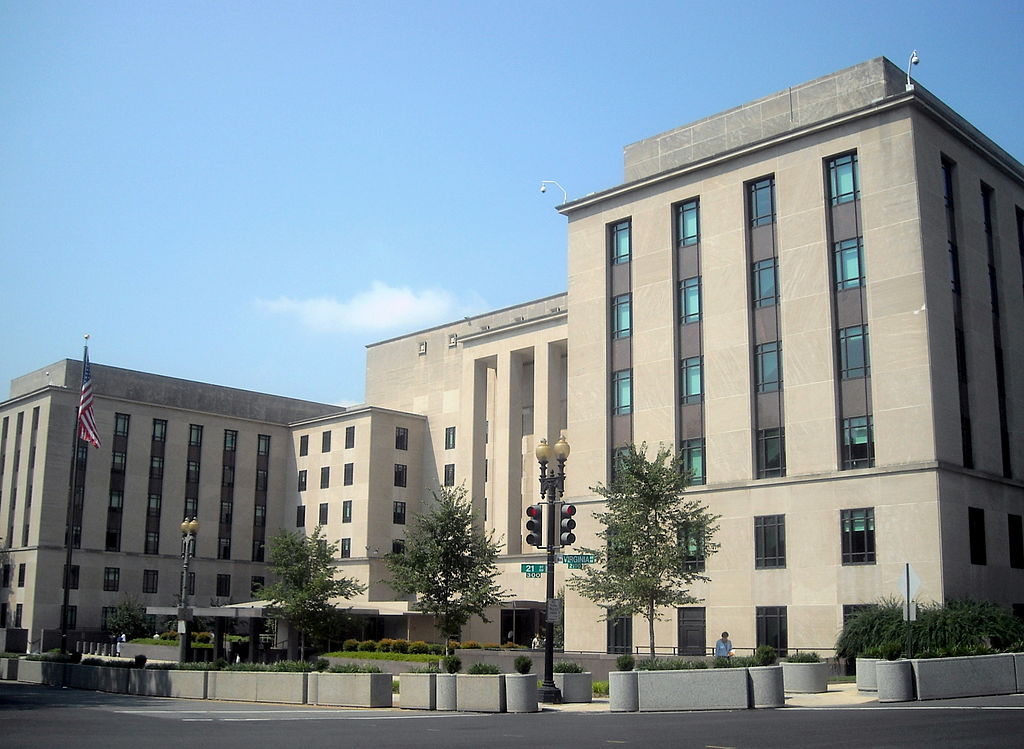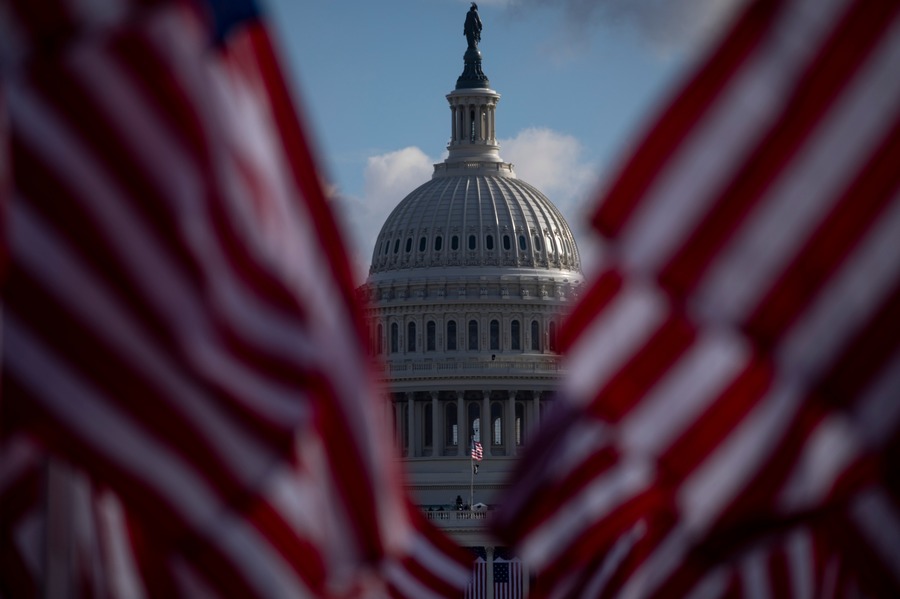An Important Development in the Law of Diplomatic Appointments
With the Department of State Authorization Act of 2021, President Biden signed into law substantial constraints on ad hoc diplomatic appointments. Here’s an explainer on the new law’s background and key provisions.

It is well known that the United States conducts foreign relations through not only ambassadors and Foreign Service officers but also a collection of “ad hoc diplomats”—special envoys and other irregular agents whose positions are often temporary and focused on relatively narrow issues, such as human rights in North Korea, hostage recovery or the negotiation of a single treaty. This practice reaches back to the Founding and generates occasional contestation between the political branches but historically has encountered few statutory limits. With the Department of State Authorization Act of 2021, however, President Biden recently signed into law substantial constraints on ad hoc diplomatic appointments. This post provides background on the new statute, discusses its key provisions and significance, and raises questions about its future implementation.
Background
The law in this area begins with the Appointments Clause, which states in part that the President
shall nominate, and by and with the Advice and Consent of the Senate, shall appoint Ambassadors, other public Ministers ... and all other Officers of the United States[.]
This language clearly establishes that advice and consent are necessary for the appointment of any individual who will qualify both as a “public Minister[]” and as an “Officer[] of the United States.” The executive branch thus has advanced two primary claims to justify the unilateral appointment of many ad hoc diplomats: First, some of these individuals are not “formally accredited to ... foreign governments as official diplomatic representatives of our government” but serve instead as “personal representatives of the President,” so they are not “public Ministers.” Second, many of them hold a position that is not “continuing” but is instead “personal,” “transient” or “incidental,” so they are not “Officers of the United States.” For support, the executive has relied heavily on past practice, which includes many unilateral appointments.
These claims are questionable in some respects. Historical evidence suggests that the original understanding of “public Ministers” encompassed certain types of unaccredited agents, in addition to agents on special missions of limited duration and mandate. This evidence also suggests that the Framers viewed qualification as an officer of the United States as a consequence of an appointee’s qualification as a public minister, rather than as a separate and independent precondition to the need for advice and consent. President Washington thus sought and obtained the Senate’s approval in appointing agents on special missions as treaty negotiators on many occasions.
Congress, however, has done little, at least by way of legislation, to challenge the executive’s basic claims. In fact, Congress has enacted general legislation on ad hoc diplomatic appointments only twice. Section 302 of the Foreign Service Act of 1980 provides that the president may independently confer the “personal rank of ambassador or minister on an individual in connection with a special mission for the President of a temporary nature not exceeding six months in duration” if the president gives to the Senate Foreign Relations Committee a written report that, among other things, justifies the decision not to seek advice and consent. Separately, Section 418 of the Department of State Authorities Act, Fiscal Year 2017 required the secretary of state to submit to Congress a report on all special envoys at the State Department at that time, including a detailed explanation of the necessity of each position to the effective conduct of foreign affairs. Neither of these enactments purported to condition any future appointments on Senate approval.
Unilateral appointments thus remain common. The Special Envoy for the Sahel Region of Africa and the Special Representative for Venezuela, for example, were each appointed without advice and consent, and a number of statutes expressly endorse the same practice for other positions. To be sure, in recent decades Congress has passed legislation to require advice and consent in connection with a handful of positions. Senate approval is thus a statutory prerequisite for the appointment of Special Representatives on Arms Control, Nonproliferation, and Disarmament Matters; the Special Envoy for Monitoring and Combating Anti-Semitism; and the Special Envoy for Human Rights in North Korea, among several other examples. But these kinds of interventions have been fairly atypical. Meanwhile, the president has in some cases pushed and arguably exceeded the constitutional envelope by independently appointing diplomatic agents to positions of significant influence and duration.
Contours of Section 5105
That brings us to the State Department Authorization Act of 2021, which was enacted as part of the National Defense Authorization Act for Fiscal Year 2022. By its terms, Section 5105 governs any appointment after Jan. 3, 2023, of an individual to “any Special Envoy, Special Representative, Special Coordinator, Special Negotiator, Envoy, Representative, Coordinator, Special Advisor, or other position performing a similar function, regardless of title, at the State Department” that is not “expressly mandated by statute.” The law divides these positions into three categories and establishes procedural requirements for each:
● The first category consists of positions that exist for more than 360 days and exercise “significant authority pursuant to the laws of the United States.” To these positions, the president cannot appoint without the advice and consent of the Senate.
● The second category consists of positions of any duration that do not exercise significant authority pursuant to federal law. To these, the president or secretary of state can appoint without advice and consent, after transmitting to the “appropriate congressional committees” a notification that includes:
(a) A certification that the position does not require the exercise of significant authority pursuant to the laws of the United States.
(b) A description of the duties and purpose of the position.
(c) The rationale for giving the specific title and function to the position.
● The third category consists of positions that exercise significant authority pursuant to federal law but will not exist for more than 360 days. To these, the president can appoint without advice and consent for an initial period of up to 180 days, if the secretary of state submits to the House Foreign Affairs Committee and the Senate Foreign Relations Committee a timely notification explaining:
(a) The necessity for conferring such title and function.
(b) The dates during which such title and function will be held.
(c) The justification for not submitting the proposed conferral of such title and function to the Senate as a nomination for advice and consent to appointment.
(d) All relevant information concerning any potential conflict of interest which the proposed recipient of such title and function may have with regard to the appointment.
The president may then extend such a position for up to 180 days upon transmitting to the committees a “detailed justification on the necessity of such extension,” along with information on the length of the extension and the justification for not submitting the appointment to the Senate as a nomination for advice and consent.
In effect, these provisions reinforce the Appointments Clause. A substantial collection of authority suggests that the term “public Minister[]” refers to any permanent or temporary diplomatic agent who officially and publicly represents the U. S. in foreign relations. Section 5105 channels that authority by implicitly positing that all of the enumerated types of agents are public ministers. But the statute accounts for the Appointments Clause in another sense as well: The Supreme Court has established that an individual can qualify as an “Officer[] of the United States” only if the position to which they are appointed (a) “exercises significant authority pursuant to the laws of the United States” and (b) is “continuing” rather than “temporary” or “episodic.” The statute explicitly incorporates the first part of this doctrine, operationalizes the second part to refer to positions that exist for roughly a year or more, and thus prohibits appointment without advice and consent only insofar as a prospective ad hoc diplomat qualifies as an officer. As before, the president can act alone to appoint non-officer public ministers.
Section 5105 also abandons controversial features of a similar bill from 2017. According to the Justice Department, Section 301 of the Department of State Authorities Act, Fiscal Year 2018 (S. 1631) would have violated the Appointments Clause by requiring the secretary of state, rather than the president, to make nominations for advice and consent to the appointment of ad hoc diplomats who are officers. The bill allegedly would have encroached on executive removal power by requiring Senate approval for the retention of many incumbent appointees. And it allegedly would have infringed on the president’s power to conduct foreign relations by cutting off funding in some cases for temporary positions whose occupants would qualify as mere employees.
The new law, in contrast, does none of these things. It does not purport to empower the secretary of state to make nominations for advice and consent. Its requirements do not apply to incumbent diplomats. And it does not threaten to cut off any funding.
Significance of Section 5105
Section 5105 is noteworthy primarily for its breadth. Unlike all prior enactments in this area, which have at most required the president to obtain advice and consent for appointments to a small number of specific positions, the new law underscores that advice and consent is a precondition to appointment in many cases. And unlike Section 302 of the Foreign Service Act of 1980, which requires the president to justify to Congress only certain unilateral conferrals of the “personal rank of ambassador or minister,” the new law requires the president or the secretary of state to justify all unilateral diplomatic appointments at the State Department that are not “expressly mandated by statute.”
These broad provisions are consequential in several respects: They reduce the need for future legislation on appointments to specific positions. They facilitate congressional oversight by helping to ensure that Congress is aware of ad hoc diplomatic appointments. They promote presidential accountability by suggesting that the president must make appointments to temporary positions that exercise significant authority, rather than rely on the secretary of state to do so. They encourage greater reliance on ambassadors and Foreign Service officers by complicating the appointment of irregular agents. And they discourage unilateral appointments that are unconstitutional by calling on the executive to justify its actions in writing. The plausible result is an empowered Senate, along with more transparency, deliberation, vetting and accountability in the conduct of diplomacy.
Questions Going Forward
Although Section 5105 is an important development, the law raises some questions. First, does Section 5105 apply to the appointment of personal representatives of the president? As explained above, the statute addresses the appointment of “any Special Envoy, Special Representative, Special Coordinator, Special Negotiator, Envoy, Representative, Coordinator, Special Advisor, or other position performing a similar function, regardless of title, at the Department of State.” On the one hand, the “function” of a personal representative is “similar” to that of any other ad hoc diplomat in the sense that they all tend to engage in international diplomacy for limited but official purposes. On the other hand, the statute does not explicitly reference personal representatives, and they have not traditionally served at the State Department. President Biden’s signing statement did not object to any aspect of Section 5105, but given the Justice Department’s position that personal representatives are not “public Ministers,” the executive branch likely will interpret the statute as categorically inapplicable to these agents.
Second, will the executive interpret Section 5105 as mandating or merely encouraging notification to Congress? The statute permits the unilateral appointment of a non-officer if the president or secretary of state delivers a notification, and it is hard to imagine that Congress intended for compliance to be optional. At the same time, the text does not say that the president or the secretary may appoint “only if” they notify Congress, there is no provision for any kind of enforcement, and a bar on the unilateral appointment of unnotified non-officers might interfere with the president’s power to conduct foreign relations. It is conceivable that the executive branch will choose to transmit notifications without recognizing the corresponding provisions as mandatory, but that remains to be seen.
Finally, will Section 5105 succeed at discouraging unilateral appointments that are unconstitutional? One hopes that it will reinforce the role of the Senate in cases where the president or secretary of state cannot credibly claim in writing that a prospective appointee’s position lacks significant authority or is temporary. Yet unintended consequences seem possible. Perhaps the president will respond simply by designating more agents as personal representatives, on the view that their appointments are constitutionally exempt from congressional restriction. Perhaps he will avoid the law by conducting more ad hoc diplomacy through components of the executive branch other than the State Department, such as the White House and the Department of Defense. Or perhaps Congress will fail to act on notifications that suggest unilateral appointments of doubtful constitutionality. The statute may very well succeed, but these possibilities would greatly diminish its value.
In short, Section 5105 is a significant and, in several ways, promising development in the law of diplomatic appointments, but its implications are in some respects uncertain. Whether it achieves its purposes will be an issue to monitor.



.jpg?sfvrsn=5a43131e_9)
